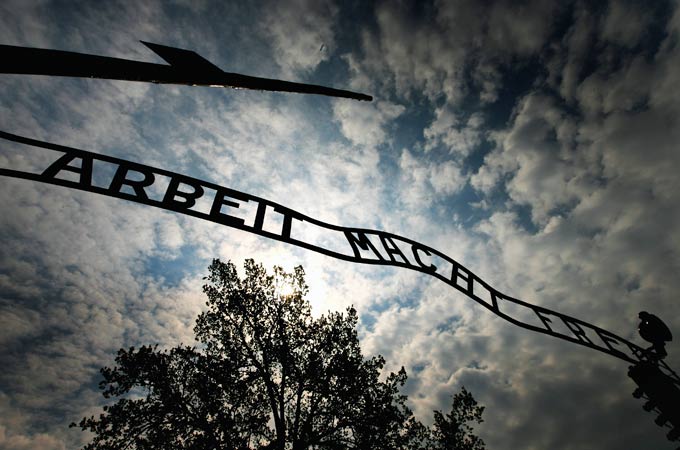Swede jailed over Auschwitz theft
Man sentenced to nearly three years for masterminding theft of “Arbeit macht frei” sign from former Nazi death camp.

 |
| The theft of the ‘Arbeit macht frei’ sign act triggered international outrage [GALLO/GETTY] |
A Swedish man has been sentenced to nearly three years in prison for masterminding the theft of the infamous “Arbeit macht frei” sign from the entry gate of the former Nazi death camp of Auschwitz.
The enduring symbol of the Holocaust, whose English meaning is “Work sets you free,” was stolen last December.
The act triggered international outrage, especially in Israel and among Jewish groups, but the metal sign was soon recovered.
The court in Krakow, southern Poland, sentenced Anders Hogstrom to two years and eight months in jail for orchestrating the theft.
When the court announced its decision, Hogstrom, 34, said: “Yes, I accept the verdict.”
Hogstrom, caught in Sweden in February, will shortly be extradited back home to serve out his sentence.
The court also handed down jail sentences of up to two-and-a-half years on two Poles who stole the sign and cut it into three pieces to fit into their car.
Three other Poles were given jail terms earlier this year for the theft which is thought to have been ordered by another Swede who has yet to be caught.
‘Historical justice’
The sign has been repaired but is now on display in the Auschwitz museum, while a replica hangs over the entrance gate to the former death camp.
“The sentence handed down by Polish authorities is not merely an expression of legal justice but also one of historical justice,” said Elan Steinberg, vice-president of the American Gathering of Holocaust Survivors and their Descendants.
“For Holocaust survivors, the theft at Auschwitz was not just about stealing a sign but about stealing our collective memory and pain.
“We commend Poland for not allowing this to happen”.
About 1.5 million people, mostly Jews, perished at Auschwitz, located near the village of Oswiecim close to Krakow, during World War Two.
Prisoners arriving at the camp used to enter via the relatively small iron gate topped by the German-language motto.
More than 200 hectares (500 acres) of the former camp became a museum after the war ended in 1945.